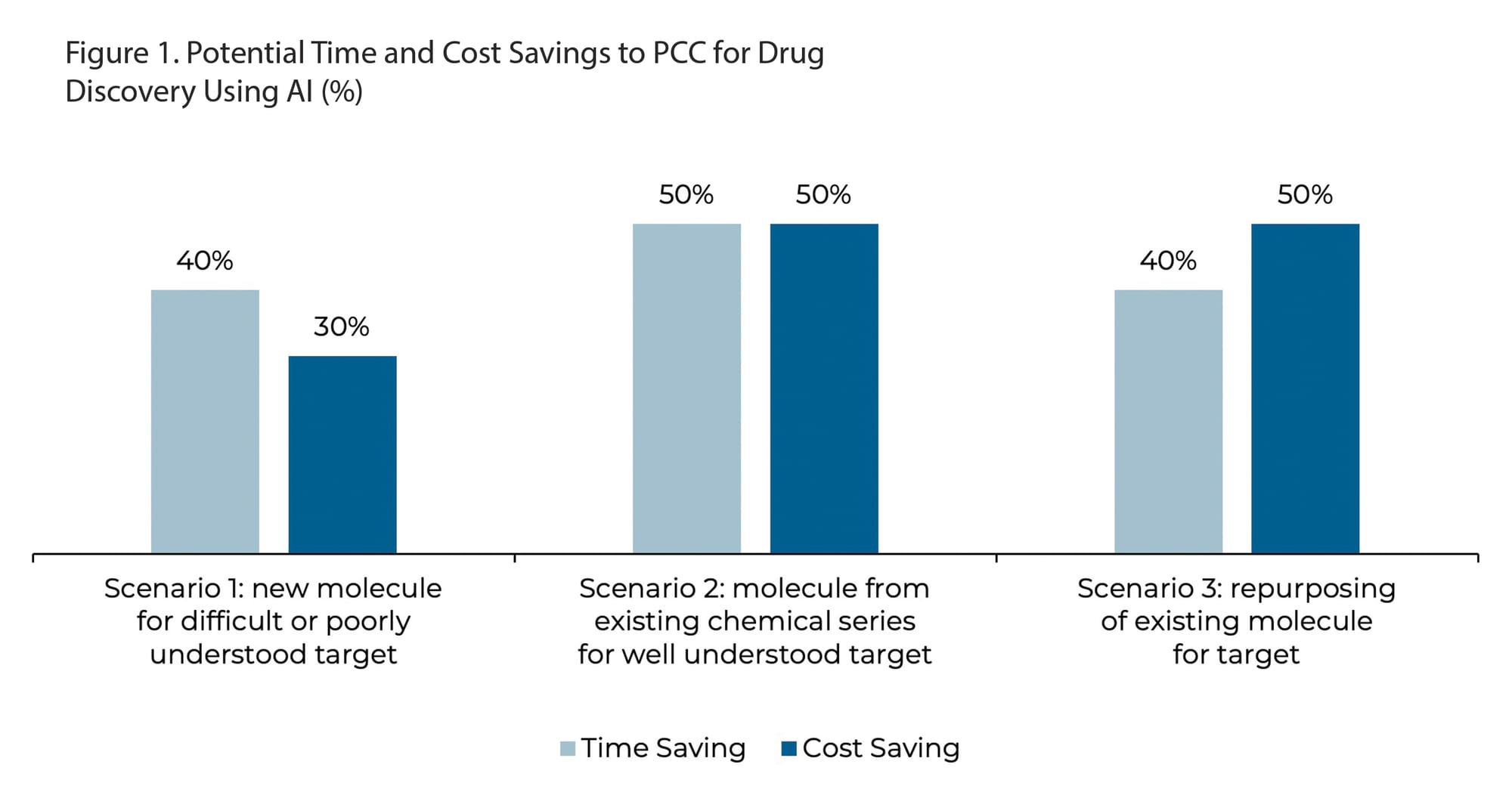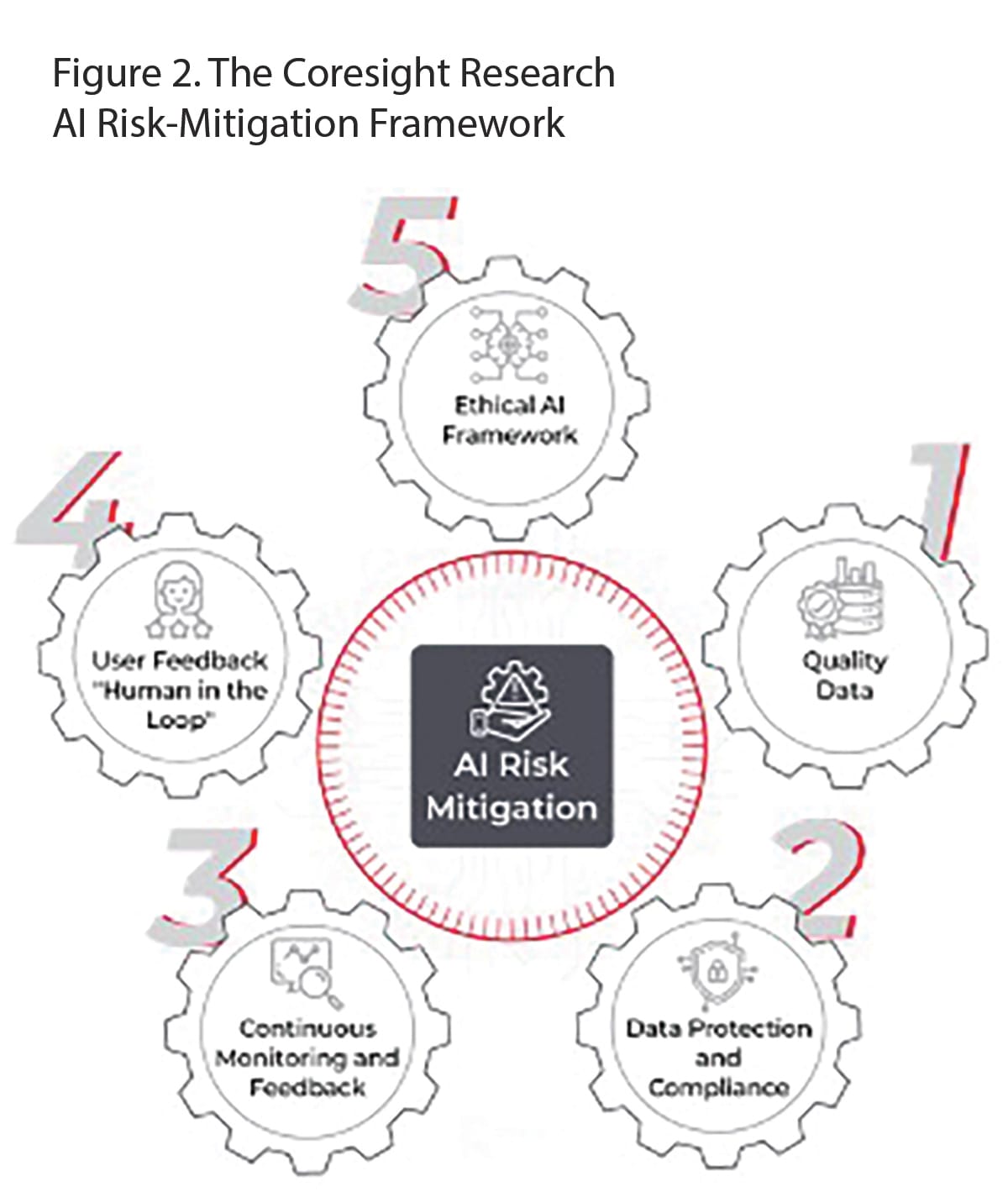By Deborah Weinswig
Artificial intelligence (AI) is transforming industries worldwide, and the health care sector is no exception. AI has the potential to revolutionize drug discovery by processing and analyzing vast data sets quickly and accurately. Industry experts at the Coresight Research NextGen Commerce conference in June 2024 highlighted both the opportunities and the challenges in leveraging AI for drug discovery. Combined with our strategies to mitigate risk when deploying AI models, these insights provide a road map for navigating the complexities of AI in this critical field.
AI applications and benefits in drug discovery
Traditionally, the process of discovering and developing new drugs has been lengthy and expensive, often taking over a decade and billions of dollars. AI can streamline this process in four key ways:

• Identification of target molecule: AI is able to efficiently interrogate large data sets to identify potential drug candidates.
• Validation of new drug molecules: AI accelerates the screening of potential compounds to verify their suitability to treating particular health conditions.
• Lead identification and optimization: AI-driven models can predict how changes to a molecule’s structure will affect its properties, helping to improve a drug’s efficacy and safety.
• Clinical development: AI can identify suitable patient populations for clinical trials by analyzing electronic health records and genetic data. In addition, as we heard at NextGen Commerce, Echo Hindle-Yang, chief executive officer of MSQ Ventures, believes that AI’s increased use in clinical trials can help optimize dosing and ensure safety.
In addition to expediting processes, AI presents huge opportunity to drive cost savings: According to U.K.-based health research foundation Wellcome Trust, AI-based drug discovery could help to save up to 50% of the time and cost for a molecule to reach the preclinical candidate (PCC) stage (shown in Figure 1).

At NextGen Commerce, Natalie Ricks, partner and chair of the board of directors at Rocky Mountain Cannabis, offered a valuable perspective on the broader implications of AI in the health care sector, highlighting how the technology aids in tracking products from cultivation to sale, improving regulatory compliance and managing inventory efficiently.
According to a report by Wellcome Trust, 47% of biotech and pharmaceutical companies globally had already started adopting AI in the drug discovery process as of June 2023. We expect adoption to grow significantly in the next few years as more companies realize its potential benefits and seek to maintain a competitive edge amid an increasingly technology-driven landscape. Furthermore, more benefits and applications will continue to emerge as AI technology advances.
Selected technology
providers
Many big players in the pharmaceutical industry are partnering with technology companies to capitalize on the benefits of AI: Eli Lilly has partnered with XtalPi for its AI and robotics support; Pfizer has partnered with CytoReason to accelerate drug development; and Novo Nordisk has partnered with Microsoft to leverage AI to accelerate research and development.
Below, we highlight four notable AI technology providers in the drug development space.
• BenevolentAI is a clinical-stage drug discovery and development company that uses AI and machine learning (ML) to accelerate processes. The company partners with major pharmaceutical companies, including AstraZeneca, to discover drug candidates for chronic kidney disease (CKD) and idiopathic pulmonary fibrosis (IPF) using its AI platform and expertise.
• Exscientia is a pharmatech company using patient-first AI to discover better drugs faster. The company aims to discover, design and develop the best possible AI-designed drug molecules that can reach clinical trials quickly.
• Insilico Medicine is a global, clinical-stage biotechnology company that uses advanced AI and ML to accelerate drug discovery and development. Insilico launched its Pharma.AI platform in November 2022, which integrates diverse biomedical data sources to identify novel drug targets and therapeutic candidates across various disease areas. According to the company, it discovered a drug candidate for IPF in less than 18 months using Pharma.AI, while the time from target discovery initiation to the start of clinical trials totaled less than 30 months.
• XtalPi is a pharma research company that combines quantum physics, AI, cloud computing and robotics for drug discovery and development. Its partners include Eli Lilly and Pfizer. XtalPi’s technology platform, ID4, supports drug candidate identification and lead optimization. At NextGen Commerce, Yide Alan Jiang, chief strategy officer of XtalPi, shared that the company recently went public on the Hong Kong Stock Exchange, reflecting growing market confidence in AI-driven drug discovery. Jiang spoke about how AI’s enablement of digital clinics and simulations has led to increased efficiency, as well as tangible benefits with fewer people and better outcomes.
Navigating AI challenges
While AI offers immense promise in drug discovery and health care product development, it also presents significant risks and challenges. At Coresight Research, we have developed a comprehensive AI Risk-Mitigation Framework to help organizations navigate these challenges at various stages of AI deployment (see Figure 2).

Before deploying AI models, ensuring data quality is crucial; poor data quality can lead to biased outcomes and flawed predictions, which would have serious implications in health care. Organizations can achieve high-quality data through rigorous data cleansing and indexing. Additionally, data protection and legal compliance are paramount. This involves implementing robust security protocols, securing cloud providers and maintaining strict data privacy standards to protect sensitive information.
During deployment, continuous monitoring and user feedback are essential to address issues such as false content, hallucination and data leaks. To mitigate these risks, our framework incorporates real-time monitoring and feedback mechanisms, often referred to as “human in the loop” systems. These systems allow for ongoing adjustments and improvements based on user feedback and observed performance. For instance, XtalPi employs a rigorous monitoring system to detect and correct any inaccuracies or biases in real time. By maintaining a feedback loop with its users and assigning final decision making to human staff, XtalPi continuously improves its AI models, ensuring they remain accurate and reliable.
Organizations must also consider the broader ethical and environmental impacts of their AI systems. Our framework advocates implementing an ethical AI framework, including compliance with relevant regulations such as the EU AI Act and NIST AI RMF, as well as providing staff with training on AI knowledge and use. This ensures that AI systems are developed and deployed in an ethically responsible and environmentally sustainable manner.
What we think
By leveraging AI, companies are not only accelerating drug discovery but also setting new standards for innovation and efficiency in the pharmaceutical and health care industries. However, the journey is fraught with challenges that require careful navigation. Ensuring data quality, maintaining rigorous monitoring and feedback systems, and adhering to ethical and environmental standards are critical components of a successful AI deployment strategy. At Coresight Research, we remain committed to helping our clients navigate these complexities, providing the insights and tools needed to harness AI’s full potential while mitigating the associated risks.
As we look to the future, continued collaboration between AI innovators, pharmaceutical companies and regulatory bodies will be crucial. By working together, we can ensure that AI-driven drug discovery and product development not only meets the highest standards of efficacy and safety but also contributes to a more sustainable and equitable health care landscape.
Deborah Weinswig is founder and chief executive officer of Coresight Research.





